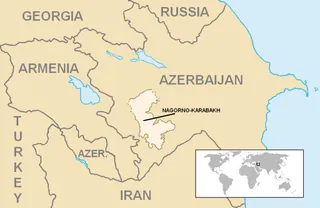Nagorno-Karabakh
Nagorno-Karabakh is a region in Azerbaijan, covering the southeastern stretch of the Lesser Caucasus mountain range. Part of the greater region of Karabakh, it spans the area between Lower Karabakh and Syunik. Its terrain mostly consists of mountains and forestland.

Some of the key events about Nagorno-Karabakh
- 1920Soviet rule imposed on Nagorno-Karabakh, suppressing local autonomy
- 1923Establishment of the Nagorno-Karabakh Autonomous Oblast within the Azerbaijan Soviet Socialist Republic
- 1988Mass demonstrations in Stepanakert calling for unification with Armenia
- 1988Ethnic tensions escalate into violent clashes between Armenians and Azerbaijanis
- 1991Declaration of independence by the Nagorno-Karabakh Republic
- 1991Nagorno-Karabakh declares independence, leading to full-scale war
- 1992Khojaly massacre results in hundreds of Azerbaijani civilian deaths
- 1994Ceasefire agreement signed, ending the First Nagorno-Karabakh War
- 1994Despite ceasefire, sporadic violence continues along the line of contact
- 2006Adoption of a new constitution by referendum in the self-proclaimed Nagorno-Karabakh Republic
- 2008Construction of a new airport in Stepanakert to improve transportation links
- 2008Clashes erupt, violating the ceasefire and causing military casualties
- 2010Skirmishes intensify, resulting in deaths on both sides
- 2012Opening of the Vardenis-Martakert Highway, connecting Armenia to Nagorno-Karabakh
- 2015Completion of the Artsakh State University's new campus in Stepanakert
- 2016"Four-Day War" breaks out, causing significant military and civilian casualties
- 2017Establishment of the "Free Artsakh" TV channel to promote local media
- 2019Implementation of a universal healthcare program for all residents of Nagorno-Karabakh
- 2020Second Nagorno-Karabakh War leads to thousands of deaths and displacement
- 2022Azerbaijani forces launch attacks, resulting in further casualties and territorial changes
Disclaimer: This material is written based on information taken from open sources, including Wikipedia, news media, podcasts, and other public sources.





























